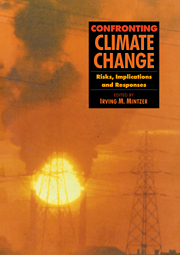Book contents
- Frontmatter
- Contents
- Foreword
- Acknowledgements
- List of Reviewers
- 1 Living in a Warming World
- I The Science of Climate Change
- II Impacts of Global Climate Change
- III Energy Use and Technology
- IV Economics and the Role of Institutions
- V Equity Considerations and Future Negotiations
- Annex I
- Annex II
- Glossary
- Index
Foreword
Published online by Cambridge University Press: 06 January 2010
- Frontmatter
- Contents
- Foreword
- Acknowledgements
- List of Reviewers
- 1 Living in a Warming World
- I The Science of Climate Change
- II Impacts of Global Climate Change
- III Energy Use and Technology
- IV Economics and the Role of Institutions
- V Equity Considerations and Future Negotiations
- Annex I
- Annex II
- Glossary
- Index
Summary
It is not only the non-specialist, the man and woman in the street and the ordinary person who finds “climate change” and “global warming” a fascinating yet difficult topic. In most societies some tenuous link to our agricultural origins ensures that the weather is a frequent feature of conversation. But weather is not climate - even if it results from it. Conflicting signs, different emphasis placed on the many strands of evidence, new knowledge and different propensities to be optimistic or pessimistic all lead to difficulties in identifying the “signal from the noise,” in recognizing trends in global climate change - in discerning evidence of a real climate warming effect.
Even scientists, trained in the scientific method are, from time to time periodically perplexed. Many physicists, chemists and those used to working at the “chemical” end of biology feel a need to have more evidence, more measurement, more research. At home with the process of inductive reasoning, hypothesis establishment and direct experimental procedures, any consensus view on climate change presents some problems due to the range of uncertainties. The whole climate change issue is, however, much more susceptible to approaches based on deductive reasoning, where information is assembled and interpretations made on the basis of the best available evidence so that a “working hypothesis” or explanation is produced, involving a minimum of assumptions. There is nothing new or “unscientific” in this approach. Agricultural scientists, and others, are used to working from sample estimates, frequency distributions and probabilities; the whole of the Earth's geological record, and the evolutionary basis of biology, has been interpreted in this way. Wait for the definitive experiment and you wait for ever.
- Type
- Chapter
- Information
- Confronting Climate ChangeRisks, Implications and Responses, pp. ix - xPublisher: Cambridge University PressPrint publication year: 1992



